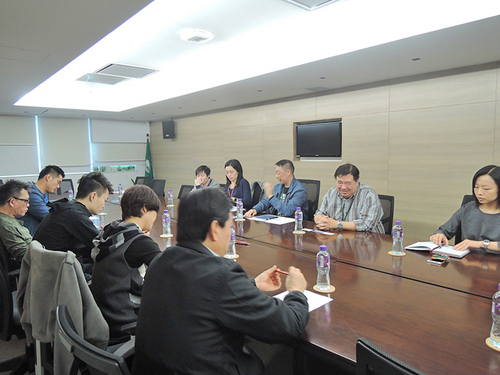 The Council met with the Macau Mobile Phones Sellers Association
The Council met with the Macau Mobile Phones Sellers Association
The Consumer Council expresses its regret at the decision made by Macau Mobile Phones Sellers Association earlier to stop fulfilling its “7-day return” policy to consumers , the Council has terminated the“Code of Practice” for the Retail Industry of Telecommunication Equipment and Supplies, and will pay attention to the effects brought to consumers.
To safeguard consumers in advance, the Council launched the“Code of Practice” for the Retail Industry of Telecommunication Equipment and Supplies in 2005, the “Code of Practice” was acknowledged by the Macau Mobile Phones Sellers Association that it helped to encourage a harmonious consumer-retailer relationship. The Code included a policy that consumers’ defective mobile phones can be returned and exchanged for the same model and colour within 7 days of purchase under certain conditions, the service was promised by all members of the Association and free of charge to consumers.
According to a written letter sent to the Council by the Association in December 2016, retailers now find it hard to follow some of the policies stated in the “Code” due to the restricted after-sales policy of certain mobile phone brands in recent years, representatives of the Association met with the Council to address their needs to amend the Code, and indicated that their members would not follow the “7-day return” policy in the Code.
The Council kept on seeking a consensus with the Association during the end of 2016 to this March, and hoped to make amendments on the Code according to the current situation. The Council met with the eight local mobile phones wholesalers, and a draft of the amended Code had been sent to the Association for feedback, however, the Association insisted on withdrawing the promise of fulfilling the “7-day return” policy on its own before reaching a consensus with the Council. The Council expresses its regret on this matter and need to terminate the Code. The Council pays attention to the effects on consumers caused by this, and plans to establish a new “Code of Practice” for the retail Industry of telecommunication equipment and supplies as soon as possible. The new Code will be monitored and all ‘Certified Shops’ are requested to strictly abide by it.
In accordance with Article 2 of Law no. 4/95/M, the Consumer Council is responsible for assisting industries to establish their “Codes of Practice” in order to enhance self-discipline within the industries, and to safeguard the awareness of consumer rights. The Council has established seventeen Codes in the past 20 years, and amendments have been made in response to the development of the consumption market and the needs of consumers.
Consumer Council’s complaint records of the recent five years
|
No. of complaints |
Top 1 |
Percentage |
2nd |
Percentage |
3d |
Percentage |
|
2016 (1,673 cases) |
Telecommunication equipment (198 cases) |
11.84% |
Real-estate agents (184 cases) |
11.00% |
Telecommunication services (144 cases) |
8.60% |
|
2015 (1,914cases) |
Telecommunication equipment (303 cases) |
15.83% |
Real-estate agents (153 cases) |
8.00% |
Telecommunication services (147 cases) |
7.68% |
|
2014 (1,668 cases) |
Telecommunication services (220 cases) |
13.19% |
Telecommunication equipment (208 cases) |
12.48% |
Food and beverage (121 cases) |
7.25% |
|
2013 (1,666 cases) |
Telecommunication services (209 cases) |
12.55% |
Telecommunication equipment (201 cases) |
12.07% |
Food and beverage (143 cases) |
8.58% |
|
2012 (1,609 cases) |
Telecommunication services (231 cases) |
14.36% |
Telecommunication equipment (202 cases) |
12.55% |
Food and beverage (124 cases) |
7.71% |


